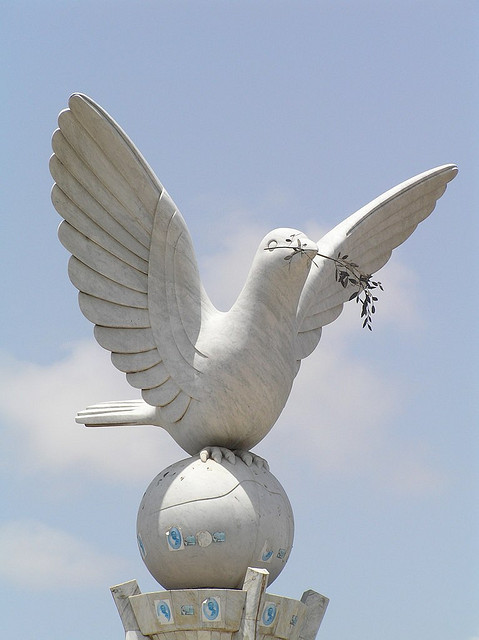Just a few months before his untimely death, John F. Kennedy negotiated what is commonly called the Partial Test Ban Treaty (PTBT) with Nikita Khrushchev. Several aspects of this bit of history interest me from a negotiation standpoint.
In “JFK as Negotiator—The Cuban Missile Crisis,” I explained my concept of Walkaway Alternatives (BATNA). Briefly, a Walkaway Alternative is your best plan for satisfying your own interests if you can’t make a better deal through negotiation. It is the true test of one’s negotiating strength.
At the beginning of his presidency, JFK had a very poor Walkaway Alternative vis-à-vis the Soviet Union, which was way ahead of the United States in nuclear arms development and stockpiling. The weakness of Kennedy’s negotiating position showed very clearly in his early attempts to negotiate with Khrushchev in Switzerland. The Russian Premier gave him no more attention or respect than if he had been a pesky schoolboy.
Kennedy placed great emphasis on catching up with the Soviets in terms of nuclear arms power at the beginning of his presidency. No doubt, he was influenced by his observations on Great Britain’s position with respect to Germany at the outset of World War II, and which inspired his book, Why England Slept.
Though he would not have put it in these terms, by catching up to the Soviet Union in the nuclear arms area, Kennedy improved his Walkaway Alternative before trying again to negotiate with Khrushchev.
This is good negotiation practice. Since a Walkaway Alternative is the true test of one’s negotiation strength, it only makes sense to beef up that Walkaway Alternative before negotiating, when time permits.
Another interesting aspect of Kennedy’s dealings with Khrushchev was developing a good working relationship. This does not mean a relationship in which two parties never disagree, but rather one in which they establish a civilized way of dealing with of those disagreements that inevitably arise.
Even though Kennedy had been humiliated by Khrushchev’s dismissive treatment in Switzerland, he refrained from humiliating Khrushchev when he prevailed on him to withdraw Soviet missiles from Cuba. This was a brilliant move on Kennedy’s part, and laid a foundation for later negotiations regarding the PTBT.
Kennedy also showed great courage by modifying his earlier position on nuclear arms on the eve of his campaign for a second term as president. In Influence—The Psychology of Persuasion, Dr. Robert Cialdini explains that humans are wired to be suspicious of leaders who change their minds. This tendency evolved at a time when it was adaptive, a time when the project at hand may have been how to bring down a mastodon without anyone getting maimed or killed.
Like many other biologically wired inclinations, the natural tendency to distrust leaders who change their minds does not always serve us well in modern situations, such as delicate and complex international negotiations. Yet, many members of the general public will follow these inclinations, not even realizing that they are instinctive, rather than the result of rational thought.
After so many years of near paranoia with respect to Communists, in general, and the Soviet Union, in particular, Kennedy took a risk that his own people might see him as weak for negotiating with the Soviets. They may have feared that the Soviet Union would not abide by the treaty.
Kennedy very persuasively eased the nation into viewing the matter differently in his speech at American University in July 1963. He succinctly affirmed the necessity of having, first, beefed up the U.S. Walkaway Alternative: “Today the expenditure of billions of dollars every year on weapons acquired for the purpose of making sure we never need them is essential to the keeping of peace.”
Then, he explained where we might go from that strong negotiation position in terms of our own best interests: “But surely the acquisition of such idle stockpiles, which can only destroy and never create, is not the only, much less the most efficient means of assuring peace.”
Lastly, he guided the nation in a first step toward viewing Communists as fellow humans: “History teaches us that enmities between nations, as between individuals, do not last forever. No government or social system is so evil that its people must be considered as lacking in virtue. Among the many traits the peoples of our two countries have in common, none is stronger than our mutual abhorrence of war.”
In a sense, we could say that Kennedy engaged in an ancillary negotiation with the American people. Some consider his American University address his best speech, and it is a textbook example of effective persuasion.
Finally, the PTBT negotiations demonstrated Kennedy’s understanding of the principle of slowing down to reach the goal faster. The PTBT did not ban all nuclear arms testing. It allowed continued testing underground. I believe the countries that signed the treaty would have gone to underground testing in any event simply to avoid spewing radioactive particles into their own environment. The treaty was a small step.
But in this situation, only small steps could prove fruitful. If Kennedy had pushed for a total ban on nuclear arms testing, especially in the atmosphere of mutual distrust that still prevailed at the time, he would have obtained no treaty at all.
Fortunately, Kennedy lived long enough to see the treaty signed on behalf of the United Kingdom, the Soviet Union, and the United States, and then ratified by the U.S. Senate. It stands as one of the greatest achievements of his life.

